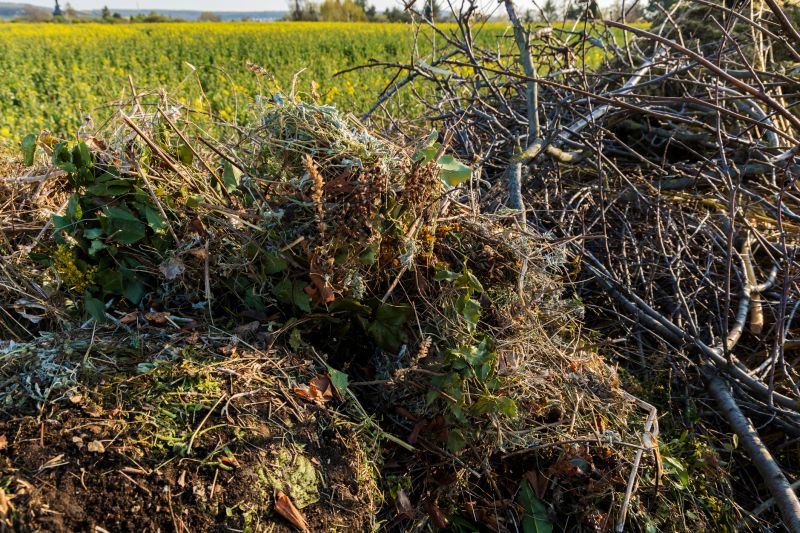Favorite Gear For Clearing and Managing Brush Piles Effectively
Get insights into popular tools that help you clear brush piles with precision, saving time and effort on your property.
 Clearing brush piles is a common task for landowners, forestry workers, and outdoor enthusiasts seeking to maintain or restore natural landscapes. The right tools can make this process more efficient and safer, whether dealing with small debris or larger, more stubborn woody material. Many options are available, ranging from manual hand tools to powered equipment, each suited to different scales of clearing projects. Selecting the appropriate product depends on factors such as the size and density of the brush, the terrain, and the user’s physical capability.
Clearing brush piles is a common task for landowners, forestry workers, and outdoor enthusiasts seeking to maintain or restore natural landscapes. The right tools can make this process more efficient and safer, whether dealing with small debris or larger, more stubborn woody material. Many options are available, ranging from manual hand tools to powered equipment, each suited to different scales of clearing projects. Selecting the appropriate product depends on factors such as the size and density of the brush, the terrain, and the user’s physical capability.
Top Overall Option
Multi-Function Brush Clearing Tool
A versatile, powered clearing tool equipped with interchangeable blades and attachments, designed to handle various types of woody debris efficiently. Its adjustable features and ergonomic design aim to provide a balance of power and user comfort, making it suitable for different clearing tasks.
Types of Products For Brush Pile Clearings
Manual Pruning Saws
Ideal for precise trimming and small debris removal, these tools are lightweight and easy to handle.
Loppers
Long-handled cutting tools suitable for reaching and trimming thicker branches.
Handheld Pruners
Compact tools designed for cutting smaller twigs and branches quickly.
Gas-Powered Chainsaws
Powerful equipment capable of cutting through large logs and dense brush with ease.
Electric Chainsaws
Lighter and quieter than gas models, suitable for moderate clearing tasks.
Brush Cutters / Clearing Saws
Designed for heavy-duty brush removal, often equipped with rotating blades or trimmer heads.
Trimmer Attachments
Interchangeable heads that convert string trimmers into brush cutters for versatile use.
Wood Chippers / Mulchers
Devices that process branches and brush into mulch, simplifying disposal.
Battery-Powered Clearing Tools
Cordless options providing mobility and convenience for smaller to medium tasks.
Hand Saws
Manual saws suitable for quick cuts on smaller branches without power tools.
Pulaski Tools
Combination tools with an axe and a grub hoe, useful for chopping and digging.
Rakes and Debris Grabbers
Tools for gathering and removing cut brush and debris after cutting.
Wheelbarrows and Carts
Equipment for transporting cut material to disposal or mulching sites.
Heavy-Duty Log Splitters
Machines designed to split larger logs into manageable pieces for disposal or use.
Handheld Hedge Trimmers
Useful for trimming smaller dense bushes and brush.
Popular Choices
Widely used for their power and ability to handle large logs and thick brush.
Popular for quieter operation and lower maintenance in smaller clearing tasks.
Commonly chosen for their versatility in clearing dense brush and overgrown areas.
Favored for convenience and mobility in medium-sized clearing projects.
Often used to process debris into mulch, making cleanup easier.
Preferred for detailed trimming and small-scale brush removal.
Popular for reaching and cutting thicker branches without power tools.
Chosen for their efficiency in splitting larger logs into manageable pieces.
Common for trimming dense bushes and small brush patches.
Frequently used for transporting debris after cutting.
Valued for their multipurpose use in chopping and digging tasks.
Popular for gathering and removing cut brush efficiently.
Manual tools like pruning saws and loppers are ideal for smaller jobs or precise removal of branches and smaller debris. For more extensive brush piles, powered tools such as brush cutters, chainsaws, and clearing saws can significantly reduce effort and time. These tools often feature adjustable blades and cutting heads, allowing users to adapt to various types of woody material. Safety equipment, including gloves, eye protection, and sturdy clothing, is essential when operating powered equipment to prevent injuries.
In addition to cutting tools, there are specialized attachments and accessories designed to enhance efficiency. For example, brush clearing attachments for trimmers or multi-tool systems can handle different tasks with interchangeable heads. Debris chippers and wood grinders are also useful for processing larger branches into mulch or chips, facilitating easier disposal or reuse. When choosing equipment, consider the power source—gas-powered tools offer mobility and strength, while electric or battery-powered options provide quieter operation and lower maintenance.
Overall, the goal is to find a balance between power, precision, and safety. Properly selected tools can help manage brush piles effectively, whether for land clearing, trail maintenance, or garden cleanup. Investing in versatile equipment that suits your specific needs can streamline your workflow and reduce physical strain, making brush pile clearing a more manageable task.
Key Buying Considerations
- Assess the size and density of the brush pile to choose appropriate power and blade size.
- Determine whether manual or powered tools are better suited for your project scope.
- Consider the power source—gas, electric, or battery—based on mobility needs and noise preferences.
- Check the weight and ergonomic features of tools to reduce fatigue during extended use.
- Look for adjustable cutting heads and blades for versatility across different types of debris.
- Evaluate safety features such as blade guards, safety switches, and anti-vibration handles.
- Review maintenance requirements and ease of sharpening or replacing blades.
- Consider the availability of accessories like chippers, mulchers, and attachments for expanded functionality.
- Factor in your physical strength and experience level when selecting powered equipment.
- Estimate the size of your project to avoid underpowered or overpowered tools.
- Look for tools with good user reviews regarding durability and performance.
- Evaluate storage and transportation options for larger equipment.
- Determine if noise levels are a concern in your work environment.
- Check for warranty and customer support options for peace of mind.
